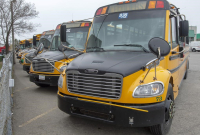Support strong Canadian climate journalism for 2025
For Politimi Karounis, August is usually spent buying new backpacks, pencils and notebooks for her two elementary school-aged children as they excitedly prepare to reunite with friends and teachers.
But this year, only weeks away from the first day of classes, Karounis said a sense of uncertainty prevails in her household around Quebec's plan to reopen all schools during the COVID-19 pandemic.
"There is no perfect decision, but as a government, make a call, acknowledge peoples' anxiety, acknowledge parents, and say: 'Listen, we hear you, here's what we're going to do,'" Karounis, who lives in Montreal's west end, said in a recent interview.
Karounis is among scores of parents across Quebec who are voicing their concerns around the government's intention for all students from pre-school through Grade 9 to physically return to classrooms at the end of the month.
She and other parents want schools to offer an option for remote learning, such as online courses. Others are asking for smaller class sizes, additional safeguards to prevent a COVID-19 outbreak, and more details about Quebec's plan should an outbreak occur.
A petition asking the government to revise its plan had garnered more than 16,700 signatures by Saturday afternoon.
Under Quebec's back-to-school strategy, which was unveiled in June and is expected to be updated on Monday, students across the province will physically go back to school full-time from pre-school to Grade 9.
The students will be divided into in-class bubbles of six, and each bubble will need to stay one metre apart from each other. Teachers will move between classrooms and maintain a two-metre distance from students.
For students in Grades 10 and 11, the current plan offers them the choice to go back full-time, or attend classes in-person one day out of two. School boards will be responsible for creating contingency measures should a COVID-19 outbreak occur.
Education Minister Jean-Francois Roberge said Aug. 6 he was working with Quebec's public health director, Dr. Horacio Arruda, and Health Minister Christian Dube to update the province's plan. He is expected to hold a news conference on Monday afternoon to reveal details.
Anxious parents and teachers say they expect Roberge to offer clear guidelines governing how schools will address COVID-19 outbreaks. They are also looking for the government to address the issue of mask-wearing inside school buildings.
Marwah Rizqy, Opposition education critic with the Liberals, sent more than two dozen questions to Arruda in a public letter dated Aug. 3.
"Is the mask mandatory? Are you going to test all the kids if you have only one case, or you're only going to test the kids from the same bubble?" Rizqy said in a recent interview, about some of the outstanding questions that parents, teachers and lawmakers have.
"I think parents have the right to know how they're going to manage if there's COVID-19 inside the school. I think they have the right to know if there is a real health emergency protocol."
Heidi Yetman, president of the Quebec Provincial Association of Teachers, which represents 8,000 teachers at English-language school boards in the province, said her members are anxious because they feel like they can't adequately prepare for their students' return.
The government closed elementary and high schools across Quebec in March when the pandemic began. High schools remained shuttered through the school year, while elementary classes outside the Montreal area reopened in May.
"There's this feeling in the air that we're heading towards this big storm," Yetman said in a recent interview. She said a major concern is the government's plan to bring 100 per cent of students up to grade 9 back at once.
"If we cram 36 students (into a class), even with the bubbles and the distancing ... we're going to have more (COVID-19) cases, absolutely, and we're going to have closures," she said.
High schools should remain at 50 per cent capacity, using alternating schedules, Yetman said. A six-student bubble may look good on paper but that system "would be very, very difficult to manage," she added.
Yetman said the province should make masks mandatory for students aged 12 and up, provide additional cleaning supplies and portable hand-washing stations, and fund more mental health support services.
Quebec should also create a province-wide protocol in the case of COVID-19 outbreaks, and push the school start date after Labour Day to give teachers more time to prepare, Yetman said.
Julius Grey, a Montreal-based constitutional lawyer, said the province could face a lawsuit if it doesn't allow schools to offer remote learning.
Grey sent a letter on behalf of Karounis and three other parents to the government on Aug. 5, demanding a remote learning option and arguing the physical attendance requirement violates the Canadian Charter of Rights and Freedoms.
"There should be an alternative provided of remaining registered in the school and getting assistance from the school without physically going there," Grey said in a recent interview.
Karounis said she plans to keep her children at home because her mother, who often takes care of them, is immunocompromised and more susceptible to contracting COVID-19.
She said she hopes the education minister will listen to parents' concerns and provide them with a distance learning option.
"We're hopeful that the minister is going to take our concerns into consideration when elaborating the new plan," Karounis said.
This report by The Canadian Press was first published Aug. 9, 2020.





Comments